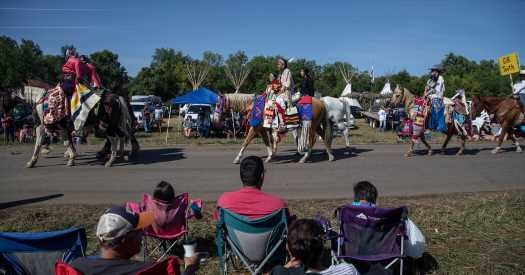The American Civil Liberties Union and the Native American Rights Fund filed a lawsuit on Monday challenging two new election laws in Montana as unconstitutional infringements on Native Americans’ right to vote.
Montana legislators enacted the laws — H.B. 176, which eliminated same-day voter registration, and H.B. 530, which restricted ballot collection — this spring, amid a national Republican push to tighten voting regulations in connection with President Donald J. Trump’s false claims of election fraud.
The lawsuit argues that the measures in Montana, where an estimated 6.5 percent of the population is Native American and district courts struck down another ballot collection restriction last year, are “part of a broader scheme” to disenfranchise Native voters. It argues that the laws violate the right to vote, freedom of speech and equal protection under the Montana Constitution.
“The legislature knows that Native Americans are very distant from registration opportunities,” said Jacqueline De León, a staff attorney at the Native American Rights Fund. “They know that they have a very limited window to register and vote on the reservation, and they know that so many homes don’t receive residential mail delivery, and so they are again, I think, taking advantage of those barriers and amplifying them.”
The lawsuit was filed in Montana’s 13th Judicial District Court on behalf of the advocacy groups Western Native Voice and Montana Native Vote, as well as multiple tribes. The defendant is the Montana secretary of state, Christi Jacobsen.
Ms. Jacobsen said in a statement on Monday, “The voters of Montana spoke when they elected a secretary of state that promised improved election integrity with voter ID and voter registration deadlines, and we will work hard to defend those measures.”
Native Americans who live on reservations often have to travel long distances to reach an elections office or polling site, and many don’t own cars or can’t take time off work for what can be several hours round-trip. Many have relied on same-day registration in order to make that trip once instead of twice.
Keaton Sunchild, the political director at Western Native Voice, said that last year, nearly 1,000 Native Americans registered to vote after the deadline set under one of the new laws.
Other Native Americans vote absentee, which poses challenges because reservations often lack reliable mail service. As a result, get-out-the-vote groups often collect and return voters’ sealed ballots. One of Montana’s new laws forbids anyone to provide or accept a “pecuniary benefit” in exchange for collecting ballots.
Supporters of the laws say they will increase election security, though there is no evidence of any widespread irregularities in the 2020 election. The lawsuit says that “many tribal members rely on paid ballot collectors,” including ones hired by Western Native Voice and Montana Native Vote, which do extensive get-out-the-vote work.
H.B. 530 differs from the ballot collection law struck down last year in that it applies only to paid collection and not to, for instance, informally collecting ballots from neighbors. But Alora Thomas-Lundborg, a senior staff attorney at the A.C.L.U., said that because so many Native Americans relied on organized collection programs, it was “functionally the same” in its impact.
“We do see this lawsuit as an extension of the pattern that we saw in the earlier lawsuit,” Ms. Thomas-Lundborg said, “which is a clawing back of Native American voting rights in the state of Montana.”
Source: Read Full Article
